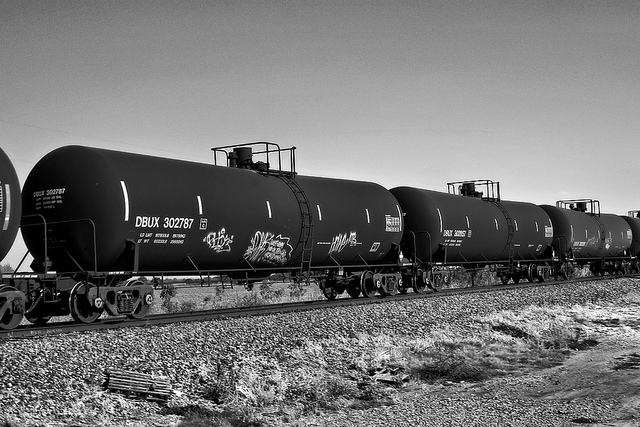Ever since the Lac-Mégantic tragedy, there’s a question which constantly comes up with regards to oil transportation. Are we better off transporting oil by rail or using pipelines? That’s in fact a red herring.
All the projected pipelines announced by the Canadian oil industry would be insufficient to transport all of the tar sands’ oil production capacity. The Canadian Energy Research Institute (CERI)’s estimates indicate that tar sands oil production will exceed 2.5 million barrels per day in 2013. Projections based on the industry’s announcements predict that tar sands production will reach around 9.2 barrels per day.
Nevertheless, the oil transportation capacity towards the East would only be 1.4 million barrels per day even if all current pipeline projects were to be built. The Enbridge Line 9B Reversal Project represents a capacity of 300,000 barrels per day whilst TransCanada’s Energy East plan would have a maximum capacity of 1.1 million barrels per day.
The transportation market will be even more quickly saturated by all the increase in oil production if we take into account that British Columbia said no the Northern Gateway Pipeline Project (which would have given the oil industry access to the Pacific Ocean) and that President Obama still opposes the Keystone XL Pipeline. Oil companies will thus use all available means to transport their product. Hence, even if all pipeline projects were to be approved, trains filled with oil would still be steaming across the country. Indeed, even if all projects are implemented, pipeline transportation capacity will remain insufficient (p. 1).
The debate surrounding the relative danger of the available means of transportation is rendered useless because whatever the number of pipelines, companies are already trying to increase their production and will need to transport it by all possible means (p. 29). Worryingly, Enbridge cannot boast of a glowing security record for its pipeline: it’s had more than 70 spills each year throughout its network in the last 10 years. Furthermore, the company is responsible for the most important land-based oil-spill in America on the Kalamazoo River. It has cost more than $1 billion dollars and its devastating effects are ongoing.
Allowing the number of pipelines to increase on our territory only increases the risk of pipeline-related oil spills without minimizing rail-related security risks. The real issue is not which means of transportation; it’s what is being transported. To truly ensure the security of both our environment and our communities, we must decrease our oil consumption. Only by decreasing oil transportation can we minimize security risks.
Quebec Premier Pauline Marois has already announced that she will prioritize electric vehicles in the province’s new energy strategy. Clearly, the people of Quebec are facing important choices: going forward with a decrease in oil dependence in the medium term or instead increasing that very dependence.
Bertrand Schepper is a researcher with IRIS — a Montreal-based progressive think tank.
Photo: Carol Von Canon/flickr



